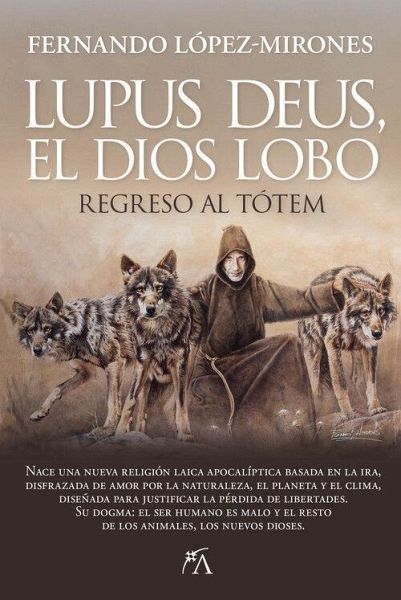
LUPUS DEUS, EL DIOS LOBO: REGRESO AL TÓTEM
Versandkostenfrei!
Versandfertig in über 4 Wochen
24,99 €
inkl. MwSt.

PAYBACK Punkte
12 °P sammeln!
Tras el convencimiento falaz de que sobran seres humanos en el planeta, se extiende amenazante una ideología inducida que considera que la vida de una mascota es más valiosa que la de personas que disienten, bebés no nacidos, o ancianos enfermos.Nace así una peligrosa nueva religión laica apocalíptica basada en la ira, pero disfrazada de amor por la naturaleza, el planeta y el clima. Un nuevo sistema de valores que está poniendo en jaque las libertades. Su dogma: el ser humano es malo y el resto de los animales son los nuevos dioses. Esta coartada moral de 'la naturaleza herida' se est�...
Tras el convencimiento falaz de que sobran seres humanos en el planeta, se extiende amenazante una ideología inducida que considera que la vida de una mascota es más valiosa que la de personas que disienten, bebés no nacidos, o ancianos enfermos.Nace así una peligrosa nueva religión laica apocalíptica basada en la ira, pero disfrazada de amor por la naturaleza, el planeta y el clima. Un nuevo sistema de valores que está poniendo en jaque las libertades. Su dogma: el ser humano es malo y el resto de los animales son los nuevos dioses. Esta coartada moral de 'la naturaleza herida' se está utilizando para sojuzgar a la humanidad.Un extraño encuentro con una manada de lobos en el Parque Nacional de Yellowstone, en Montana, hace veinticuatro años, abrió la reflexión de este zoólogo sobre el significado místico de un animal totémico más allá de la biología. En estas páginas argumenta, con un enfoque original y aportando datos asombrosos, lo que aquella increíble experiencia le enseñó: la diferencia entre dos perspectivas opuestas; el lobo de Dios ùlupus deiù y el dios Lobo ùlupus deusù.El lobo es una criatura de Dios, pero no es un dios, como quieren que creamos. En ese matiz se sustenta toda la narrativa de agendas medioambientales, sociales y económicas planteadas por organismos supranacionales, ONG y falsos filántropos que promueven este postulado pseudorreligioso cientifista basado en que el hombre está destruyendo el planeta, pero, ¿y si no fuera cierto?


